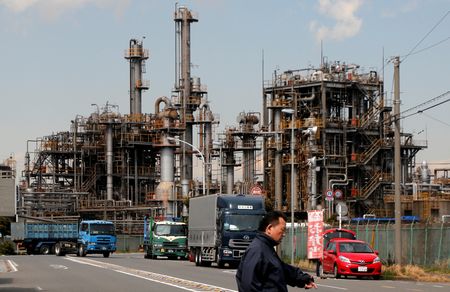TOKYO (Reuters) – Japan’s manufacturing activity contracted for the first time in nearly two years in November, a private survey showed, as a slump in demand and output deepened driven largely by a slowdown in the global economy and still-elevated inflationary pressures.
Thursday’s survey data suggest the world’s third-biggest economy will remain underpowered for a while longer as demand conditions soften broadly and China – a major trading partner – grapples with a renewed spike in COVID-19 cases.
The au Jibun Bank Japan Manufacturing Purchasing Managers’ Index fell to a seasonally adjusted 49.0 in November from October’s 50.7 final, and below the flash reading of 49.4.
It was the weakest level since November 2020 and marked the first move below the 50-mark that separates contraction from expansion in 22 months.
“Cooling market conditions, sustained cost pressures and weak underlying demand, both domestically and internationally, were reportedly pivotal factors contributing to the declines,” said economist Laura Denman at S&P Global Market Intelligence, which compiles the survey.
Output and new orders slipped to their lowest levels since August 2020, the survey’s subindexes showed. Orders from overseas clients also suffered the sharpest decline in 28 months, underlining the slowdown in overall global growth and demand.
The survey results back separate data released on Wednesday showing shrinking factory production and feeble business conditions in October.
On top of the global pressures, a weaker yen currency has further driven up import prices and cost-of-living pressures, leaving Japan’s economy battling to mount a solid recovery from the pandemic.
Input prices cooled to the lowest in 14 months, the survey showed, but output prices only dropped to a three-month-low and remained at elevated levels.
“Concerns surrounding price pressures also dampened business sentiment which did weaken slightly from October,” Denman said.
“Selling price inflation remained among the sharpest on record to indicate that price pressures are likely to remain in the coming months and contribute to low levels of demand.”
Overall, however, manufacturers’ business sentiment remained resilient on expectations for a further improvement in Japan’s COVID-19 situation, according to the survey.
(Reporting by Kantaro Komiya; Editing by Shri Navaratnam)

